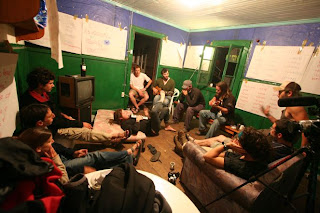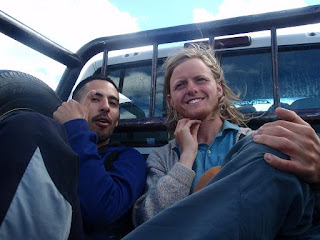1600 kilometers lay between us and Buenos Aires. Hitching as a team of three would take time. Time, we didn’t have. A brainstorming session of our options left us with the resolution to split up. We were going solo, but with a little flair.
We would race. A no holds barred hitchhiking race. No public transportation. No paying, or offering to pay for rides. Thumbs only. It was a mission, as Pétur would say.
Haukur:
Haukur never waited for more than fifteen minutes. He wasn’t even trying when he got his first ride. A car simply saw him walking out of Bariloche and pulled over.
Halfway into the first day a sedan pulled over. A middle-aged Argentine man offered to take him to Tres Arroyos, a few hours from Buenos Aires. A long ride. Night came. They pulled into a small town for some rest. They dined together, and afterwards the Argentine offered to buy Haukur a drink before bed. One drink became many. With alcohol in his veins the Argentine couldn’t suppress his desires. There was a transvestite prostitute in the bar that had struck his fancy, and, promising to get Haukur in the morning; the driver went off with him/her to a local motel. Haukur was drunk and alone. He had nowhere to go, and found the ground behind the bar to be a suitable bed.
He was awoken with a stir early the next morning. His chauffer was ready to get as far away from that town and his own shame as quickly as possible. They never talked about what happened.
From Tres Arroyos it was a massive, pot-bellied trucker that took him the rest of the way to the Capital Federal. A father of four, the trucker loved his children, hookers, and heroin. Stopping for food, the trucker bought half of a roasted pig, and ate the entire thing whole while flying down the highway, the grease dripping on his belly.
Haukur arrived in less than two days, covering 1600 kilometers in an unprecedented 42 ½ hours.
Christopher Brendan:
The morning was chilly when I started off, with clouds in the distance threatening rain. I walked several kilometers to the border of the Rio Negro and Neuquen provinces. I would spend eight hours at that border. No one stopped. By mid-afternoon the rain came. I had no jacket. I stood by the road soaked and cold, the wind chilling me to the bone. Evening arrived, bringing at last the sun and more hitchhikers.
Natalia and her seven-year-old sister, Antonia, were on their way home after spending a weekend volunteering, building natural and self-sustaining houses for the less fortunate living outside of Bariloche. We teamed up. Between us we had enough gear and food to survive the night. Our worries were needless. Twenty minutes after meeting, the three of us were in the back of a pickup truck, heading 400 kilometers to the capital of Neuquen.
Huddled under sleeping bags in the truck bed, we talked of consumer society and how we were going to change the world with a certain romanticism that only people our age have. Antonia slept cuddled between us as we watched the sun go down and the stars come out one by one.
I hopped out of the cab at the bus terminal in the town of Cipolletti. Feverish from the rain and cold, the ground outside the terminal was where I laid my head for the night.
The next day was hours of walking along the highway until a couple of short rides left me in Villa Regina, essentially nothing more than a truck stop. Forty kilometers outside of town, in the direction I was going, the highway workers were on strike, shutting down the highway between four and eight P.M. everyday. I arrived at three P.M.
At seven that evening a VW hatchback pulled over with two young guys in it. They were on their way to Buenos Aires, but had to finish working and would be heading out around midnight. I was welcome to come along; I just had to meet them in front of their hotel before they left.
Ecstatic, and thinking there was no chance of anyone beating me; I celebrated with a hearty dinner and a beer.
I decided to catch up on some sleep. So not to miss my ride; I lay down in front of the hotel where I was to meet my new friends. I was awoken to blue flashing lights. Apparently, the “homeless man” sleeping outside was making the guests uncomfortable.
The guys showed up on time as promised. It was a nineteen-hour ride in the back seat between two suitcases and my backpack. I slept for fourteen hours straight. We pumped reggae and maté the rest of the way until the smell of exhaust and dog shit led us back into the city.
Walking into Plaza de Mayo around 8:30 P.M. I arrived with a time of 56 and ½ hours.
Pétur:
Pétur is good with the ladies. Pétur is horrible at hitchhiking. He had no phone, no map, no Spanish, and two months without shaving left him looking like a 40-year-old-rapist. Haukur and I heard nothing from him for five days. When the weekend came, we assumed he was dead, or in Bolivia.
His first day he only got 50 kilometers and was left once again in Confluencia, the wonderful little town that had already called the police on us (Bariloche, The Valley). We don’t have a good reputation there, so he spent the night in a cave off the main road.
He slept under trees and bridges, hitched two motorcycles, shared coco leaves with a trucker, and got picked up by a family who not only made him dinner, but let him sleep at their home, and drove him back to the highway the next morning.
After five days on the road he was let off on the side of the highway 60 kilometers from Buenos Aires. The cars flew by at 150 kilometers and hour. “Fuck it,” he thought, “I’ll just walk.” A family driving past saw him stranded on the road and, like Haukur, pulled over for him. Their van had no seats in the back and Pétur enjoyed the final part of the trip on the floor with four kids, playing with them in broken Spanish.
109 hours. Pétur didn’t even come close.





We were finished. I cannot sum all this up with some profound conclusion, so I leave you with the words of a friend.
“Travel is such a funny thing. It’s a wonderful idea filled with adventure and romance- romantic ideas of places and all the wonderful things to do there with all the people to meet and all the people to be.
The truth is that a place isn’t anything until you invest something into it and live and walk and feel it. Be in it. Until then, it is all just a romance story written by some sleazy novelist for widows and housewives. Or small kids with big plans and even bigger ideas about big places where big things happen to big people.
Travel is bigger than the places, bigger than stories and certainly bigger than I can re-tell or summarize- it is the act of being lost mentally and physically without regard or worry to find a destination.”
-Robert Bottomley













































